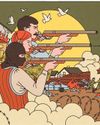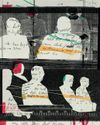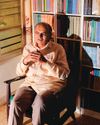
Once upon a time, a family by the name of Grimm carried on a life name of Grimm carried on a life that was anything but. In the wooded German state of Hessen, Philipp, a town clerk, lived with his wife, Dorothea, and their children in a quaint cottage. Its exterior was an inviting light red, and its doors tan, as if made of gingerbread. The drawing room had been wallpapered with pictures of huntsmen, onto whose faces the two eldest boys, Jacob and Wilhelm (born in 1785 and 1786, respectively), would cheekily pencil in beards. Soon, Philipp was promoted to serve as the magistrate of a town nearby, and the Grimms moved into a stately home staffed with maids, a cook, and a coachman. Every Christmas, the family decorated a tree with apples, as was the German custom. In the summer, the children ventured into the surrounding woods to collect butterflies and flowers, confident they could find their way back home.
Then, one day, a dark cloud appeared, as if summoned by a witch jealous of their domestic idyll. In 1796, Philipp, only forty-four years old, succumbed to pneumonia. Jacob later recalled seeing his father's body being measured for a coffin. Dorothea and her children were ordered to clear out. Without Philipp's income, they were forced for a time to shelter in an almshouse just next door cursed with a view of their former home and the courtyard where they once played, happily, until what came after.
This story is from the November 11, 2024 edition of The New Yorker.
Start your 7-day Magzter GOLD free trial to access thousands of curated premium stories, and 9,000+ magazines and newspapers.
Already a subscriber ? Sign In
This story is from the November 11, 2024 edition of The New Yorker.
Start your 7-day Magzter GOLD free trial to access thousands of curated premium stories, and 9,000+ magazines and newspapers.
Already a subscriber? Sign In

GET IT TOGETHER
In the beginning was the mob, and the mob was bad. In Gibbon’s 1776 “Decline and Fall of the Roman Empire,” the Roman mob makes regular appearances, usually at the instigation of a demagogue, loudly demanding to be placated with free food and entertainment (“bread and circuses”), and, though they don’t get to rule, they sometimes get to choose who will.

GAINING CONTROL
The frenemies who fought to bring contraception to this country.

REBELS WITH A CAUSE
In the new FX/Hulu series “Say Nothing,” life as an armed revolutionary during the Troubles has—at least at first—an air of glamour.

AGAINST THE CURRENT
\"Give Me Carmelita Tropicana!,\" at Soho Rep, and \"Gatz,\" at the Public.

METAMORPHOSIS
The director Marielle Heller explores the feral side of child rearing.

THE BIG SPIN
A district attorney's office investigates how its prosecutors picked death-penalty juries.

THIS ELECTION JUST PROVES WHAT I ALREADY BELIEVED
I hate to say I told you so, but here we are. Kamala Harris’s loss will go down in history as a catastrophe that could have easily been avoided if more people had thought whatever I happen to think.

HOLD YOUR TONGUE
Can the world's most populous country protect its languages?

A LONG WAY HOME
Ordinarily, I hate staying at someone's house, but when Hugh and I visited his friend Mary in Maine we had no other choice.

YULE RULES
“Christmas Eve in Miller’s Point.”